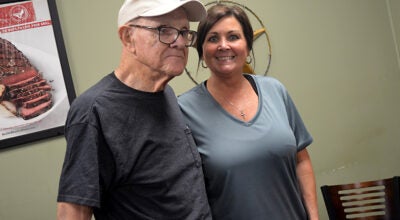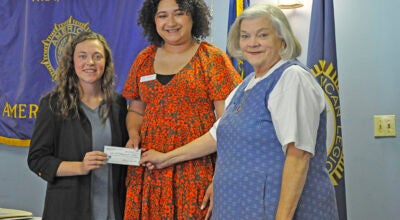Female Factor speaker talks heart disease
Published 3:00 am Thursday, February 9, 2017

Dr. Andreas Muench, an interventional cardiology physician in Dothan, spoke at Wednesday’s Female Factor luncheon about heart disease.
The Female Factor luncheon on Wednesday at The Studio attracted a large number of women for a heart to heart talk with Dr. Andreas Muench, an interventional cardiology physician in Dothan. He is affiliated with Southeast Alabama Medical Center and also Troy Regional Medical Center.
Muench was introduced by Ovid Walden as “my cardiologist.”
Walden said, based on her experience with heart disease, she would recommend Muench to anyone with heart issues or concerns.
Muench endeared himself to the audience by acknowledging, with a hint of German accent, that he doesn’t talk like them.
Muench received his education and training at the University of Texas Health Science Center. He completed a residency at the University of Kansas School of Medicine. He has been in practice for more than 20 years He quickly got the undivided attention of his female audience by driving home the point that heart disease is the number one killer of women in the United States. Heart disease claims the lives of more women than all forms of cancer.”
Muench displayed a map showing the prevalence of heart disease in women across the United States.
“You can see that heart disease among women is more common in the South,” he said and added with a smile, “maybe because of the lifestyle here.”
Muench highlighted the risk factors that are common to women, including high blood pressure, high cholesterol, diabetes, smoking, obesity, inactivity and a family history of early heart disease. Age is also a factor, he said. These risks can be reduced by achieving and maintaining a healthier lifestyle, including eating healthier, losing weight, stopping smoking and exercising if only a 15 minute walk each day.
“There is nothing that can be done about age or a family history of heart disease but the other risks factors can be reduced,” Muench said. The symptoms of a heart attack in women is often not the same as for a man,” Muench said.
“The heart attack symptoms for women can be chest pains or tightness in the chest, pain in the shoulders, neck, jaw and arms, severe fatigue, shortness of breath and heart palpitations.”
Muench said told the gathering of women that heart disease can be diagnosed in several ways including a stress test, which may be conducted on a treadmill or with medication. Heart disease can also be detected with an electrocardiogram or cardiac catheterization, he said and explained each method. “Catheterization has come a long way,” he said.
It is now possible for the catheter to be inserted in the arm rather than the groin area. The patient is usually able to return to normal activity in a few days.
Muench also explained how stents are used to help keep coronary arteries open and reduce the chance of a heart attack.
Following his presentation, Muench opened the floor for questions that ranged from the effect second hand smoke has on the heart and why to whether it’s wiser to wait for the paramedics to arrive or the transport a suspected heart attack victim to a hospital. From all indications, those who attended the Female Factor are serious about their heart’s health and willing to lead more heart-healthy lives.





